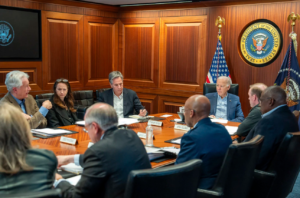The recent escalation of tensions between Iran and Israel has raised concerns within the Biden administration regarding the potential consequences of an Israeli response to Iran’s attack. Here, we delve into the intricacies of this delicate situation, examining the perspectives of key players and the underlying dynamics at play.

President Biden’s Stance on Israel’s Defense
President Joe Biden has reiterated the United States’ unwavering support for Israel’s defense, emphasizing the “ironclad” commitment to ensuring Israel’s security. However, behind closed doors, there is apprehension within the Biden administration regarding Israeli Prime Minister Benjamin Netanyahu’s approach to the escalating situation.
Apprehensions and Private Discussions
Reports suggest that President Biden has privately expressed concerns that Israel’s response to Iran’s attack could precipitate a wider regional conflict, potentially drawing the United States into a broader military engagement. These concerns highlight the delicate balance between supporting a key ally and avoiding entanglement in a potentially destabilizing conflict.
Iran’s Calculated Retaliation
Iran’s retaliatory attack, characterized by the deployment of hundreds of drones and missiles into Israeli airspace, was unprecedented in scale yet seemingly calibrated to demonstrate deterrence without escalating to full-scale war. Experts suggest that Iran’s intention was to assert its military capabilities while avoiding a disproportionate response that could trigger an all-out conflict.
Israeli Response and Strategic Considerations
In the aftermath of Iran’s attack, Israeli officials are deliberating their response, weighing the need to uphold national security against the risk of further escalation. While asserting Israel’s right to defend itself, officials acknowledge the complexity of the situation and the potential ramifications of their actions on regional stability.
Also Read: Putin Dismisses Biden’s NATO Attack Claims as ‘Nonsense’ Amid Escalating Tensions
U.S. Anticipation and Strategic Assessment
U.S. officials had anticipated a retaliatory response from Iran following Israel’s bombing of an Iranian diplomatic compound in Damascus. However, concerns have been raised about the strategic coherence of Israel’s military actions, with some officials characterizing them as “frenetic” and potentially “catastrophically escalatory.”
Historical Context and Ongoing Dynamics
The historical animosity between Israel and Iran, compounded by divergent approaches to regional security, underscores the complexity of the current crisis. Israel views Iran as an existential threat and has advocated for a robust response to curtail Iran’s military capabilities, while Iran perceives Israeli actions as provocative and seeks to assert its regional influence.
Biden’s Diplomatic Challenges
President Biden faces the challenge of exerting influence over Israel’s military decision-making while respecting its sovereignty and security concerns. The administration’s efforts to de-escalate tensions and prevent further conflict require delicate diplomacy and strategic engagement with both Israeli and Iranian leadership.
Expert Analysis and Critique
Analysts have offered varying perspectives on the efficacy of President Biden’s approach and Israel’s strategic calculations. While some criticize the administration’s inability to influence Israeli decision-making, others warn against the risks of military escalation and advocate for restraint in U.S. foreign policy.
The Path Forward
As tensions persist and the risk of further escalation looms, the onus lies on Israel to determine its next steps and their implications for regional stability. The Biden administration continues to monitor the situation closely, balancing its commitment to Israel’s security with the imperative of avoiding a broader conflict.
Conclusion
The evolving dynamics between Iran and Israel pose significant challenges for regional security and U.S. foreign policy. As stakeholders navigate this complex landscape, the need for diplomatic engagement, strategic foresight, and measured responses becomes increasingly paramount.